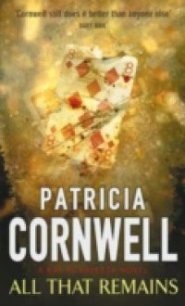Cruel and Unusual - Cornwell Patricia (книги онлайн полные версии .txt) 📗
I nodded, struggling for composure. Susan had gotten into something she did not know how to get out of, and it occurred to me that this might be the real explanation for why she fled from Eddie Heath's post and then from Jennifer Deighton's. Her emotional outbursts had nothing to do with witchcraft or feeling dizzy after being exposed to formalin fumes. She was panicking. She did not want to witness either case.
“Interesting,” Wesley said when I voiced my theory. “If you ask what of value did Susan Story have to sell, the answer is information. If she didn't witness the posts, she had no information. And whoever was buying this information from her is quite likely the person she was going to meet on Christmas Day.”
“What information would be so important that someone would be willing to pay thousands of dollars for it and then murder a pregnant woman?” Lucy asked bluntly.
We did not know, but we had a guess. The common denominator, once again, seemed to be Ronnie Joe Waddell.
“Susan didn't forget to print Waddell or whoever it was that was executed,” I said. ”She deliberately didn't print him.”
“That's the way it looks,” Wesley agreed. “Someone else asked her to conveniently forget to print him. Or to lose his cards in the event that you or another member of your staff printed him.”
I thought of Ben Stevens. The bastard.
“And this brings us back to what you and I concluded last night, Kay,” Wesley went on. “We need to go back to 'the night Waddell was supposed to have been executed and determine who it was they strapped in the chair. And a place to start is AFIS. What we want to know is if and what records were tampered with.”
He was talking to Lucy now. “I've got it set up for you to go through the journal tapes, if you're willing.”
“I'm willing,” Lucy said. “When do you want me to start?”
“You can start as soon as you want because the first step will involve only the telephone. You need to call Michele. She's a systems analyst for Department of Criminal Justice Services and works out of the State Police headquarters. She's involved with AFIS and will go into detail with you about how everything works. Then she'll begin mounting the journal tapes so you can access them.”
“She doesn't mind my doing this?” Lucy asked warily.
“On the contrary. She's thrilled. The journal tapes are nothing more than audit logs, a record of changes made to the AFIS data base. They're not readable, in other words. I think Michele called them 'hex dumps’ if that means anything to you.”
“Hexadecimal, or base sixteen. Hieroglyphics, in other words,” Lucy said. “It means that I'll have to decipher the data and write a program that will look for anything that's gone against the identification numbers of the records you're interested in.”
“Can you do it?” Wesley asked.
“Once I figure out the code and record layout. Why doesn't the analyst you know do it herself?'
“We want to be as discreet as possible. It would attract notice if Michele suddenly abandoned her normal duties and started wading through journal tapes ten hours a day. You can work invisibly from your aunt's home computer by dialing in on a diagnostic line.”
“As long as when Lucy dials in it can't be traced back to my residence,” I said.
“It won't be,” Wesley said.
“And no one is likely to notice that someone from the outside is dialing into the State Police computer and wading through the tapes?” I asked.
“Michele says she can maneuver it so there's no problem.”
Unzipping a pocket of his ski jacket, Wesley slipped out a card and gave it to Lucy. “Here are her work and home phone numbers.”
“How do you know you can trust her?” Lucy asked. “If tampering has gone on, how do you know she's not involved?”
“Michele has never been good at lying. From the time she was a little girl she would stare down at her feet and turn as red as Rudolf's nose.”
“You knew her when she was a little girl?” Lucy looked baffled.
“And before,” Wesley said. “She's my eldest daughter.”
9
After much debate, we came up with what seemed a reasonable plan. Lucy would stay at the Homestead with the Wesleys until Wednesday, allowing me a brief period to grapple with my problems without worrying about her welfare. After breakfast, I drove off in a gentle snow that by the time I reached Richmond had turned to rain.
By late afternoon, I had been to the office and the labs. I had conferred with Fielding and several of the forensic scientists, and had avoided Ben Stevens. I returned not a single reporters call and ignored my electronic mail, for if the health commissioner had sent me a communication, I did not want to know what it said. At half past four I was filling my car with gas at an Exxon station on Grove Avenue when a white Ford LTD pulled in behind me. I watched Marino get out, hitch up his trousers, and head to the men's room. When he returned a moment later, he covertly glanced around as if worried that someone might have observed his trip to the toilet. Then he strolled over to me.
“I saw you as I was driving past,” he said; jamming his hands into the pockets of his blue blazer.
“Where's your coat?” I began cleaning the front windshield.
“In the car. It gets in my way.” He hunched his shoulders against the cold, raw air. “If you ain't thinking about stopping these rumors, then you'd better start thinking about it.”
I irritably returned the squeegee to its container of cleaning solution. “And just what do you suggest I do, Marino? Call Jason Story and tell him I'm sorry his wife and unborn child are dead but I would certainly appreciate it if he would vent his grief and rage elsewhere?”
“Doc, he blames you.”
“After reading his quotes in the Post, I suspect any number of people are blaming me. He's managed to portray me as a Machiavellian bitch.”
“You hungry?”
“No.”
“Well, you look hungry.”
I looked at him as if he'd lost his mind.
“And if something looks a certain way to me, it's my duty to check it out. So I'm giving you a choice, Doc. I can get us some Nabs and sodas from the machines over there, and we can stand out here freezing our asses off and inhaling fumes while we prevent other poor bastards from using the self-service pumps. Or we can zip over to Phil's. I'm buying either way.”
Ten minutes later we were sitting in a corner booth perusing glossy illustrated menus offering everything from spaghetti to fried fish. Marino faced the dark-tinted front door and I had a perfect view of the rest rooms. He was smoking, as were most of the people around us, and I was reminded that it is hell to quit. He actually could not have selected a more ideal restaurant, considering the circumstances. Philip's Continental Lounge was an old, neighborhood establishment where patrons who had known each other all their lives continued to meet regularly for hearty food and bottled beer. The typical customer was good-natured and gregarious, and unlikely to recognize me or care unless my picture regularly appeared in the sports section of the newspaper.
“It's like this,” Marino said as he closed his menu. “Jason Story believes Susan would still be alive if she'd had another job. And he's probably right. Plus, he's a loser - one of these self-centered assholes who believes everything is everybody else's fault. The truth is, he's probably more to blame for Susan's death than anyone.”
“You're not suggesting that he killed her?”
The waitress appeared and we ordered. Grilled chicken and rice for Marino and a kosher chili dog for me, plus two diet sodas.
“I'm not suggesting that Jason shot his wife,” Marino said quietly. “But he set her up for getting involved in whatever it was that precipitated her homicide. Paying the bills was Susan's responsibility, and she was under big-time financial stress.”



